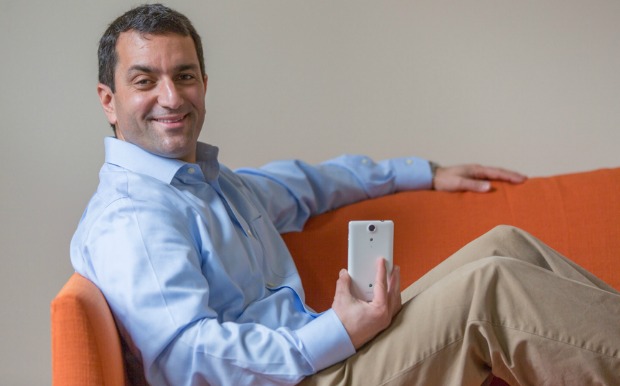Growing up in the working-class Tel Aviv suburb of Bat Yam, Israel Ganot was always working a business angle – bargaining with customers at his father’s clothing stall in Tel Aviv’s Carmel Market, hawking his own version of Cliff Notes to grade-school classmates, reselling candy at a profit on the way home from school (whatever he didn’t eat, that is).
When he graduated high school and his family moved to the New York City borough of Queens, Ganot was therefore well prepared to work his way through New York University.
He went on to play a key role in the international growth of eBay and then co-founded Gazelle, now the world’s largest cash-for-electronics trade-in website.
“I was brought up in a very entrepreneurial environment,” says Ganot, born in 1971. “I was out there haggling at the Carmel Market during weekends and school vacations, and I loved the interactions with customers.”
While in college, Ganot worked in an Israeli-owned video and consumer electronics store on Manhattan’s tony upper East Side, waiting on customers including the likes of Woody Allen and Robin Williams.
“I learned at a very young age what it means to satisfy customers who have high expectations,” he tells ISRAEL21c.
Meeting mega movers and shakers
One day, Wall Street billionaire Ron Perelman walked into the shop as Ganot was reading a book of profiles on 1980s movers and shakers – including Perelman.
“I said, ‘May I ask you a few questions?’ And he was gracious enough to spend a few minutes with me.”
Inspired partly by Perelman’s example, Ganot decided to major in finance. After his 1994 graduation, he worked at Harvard Business School for a year doing case writing. That led to his next celebrity encounter.
“One of the cases was about Microsoft, and it entailed going to Seattle and meeting Bill Gates,” Ganot relates. “It planted a seed when he talked about technology and how it’s changing people’s lives — about how the world is getting transformed.”
Before continuing on for his master’s degree at Harvard, Ganot worked for three years at the Goldman Sachs Wall Street investment house. In 1998, one of his co-workers founded Kozmo.com, a service that promised free one-hour delivery of everything from videos to coffee. Fortunately, Ganot didn’t join in this venture, as it failed by 2001.
“Kozmo became the poster child for the huge Internet boom and bust,” says Ganot. “It was my first exposure to the Internet, and it opened my eyes.”
‘Re-commerce’ is born
From 2000 to 2006, Ganot worked for eBay’s international extension and its PayPal division. As eBay’s UK director of finance, he and his team grew that division from less than $30 million in 2002 to $300 million in 2004.
Back in the United States two years later, he felt ready to somehow combine his retail and finance background with Internet commerce.
“I saw that people were buying upgraded technology every other year and the pace of innovation was really accelerating, even before iPhones,” Ganot says. “Now, what do we do with the old devices?”
Ganot had a couple of last-generation BlackBerrys he wanted to trade in rather then stashing in a drawer. “I knew I could get $75 on eBay if I had the time and patience,” he relates. Instead he brought them to a retailer and was told they would gladly recycle the devices – if Ganot paid a $20 fee.
“The notion of charging for recycling struck me as a silly idea. So I decided to flip the idea on its head and pay consumers for recycling and reusing.”
Gazelle began as a joint effort between Ganot and co-founders Rousseau Aurelien and techie James McElhiney. Aurelien came from the auto industry, where up to half of all new sales are accompanied by a trade-in. They wanted to introduce re-commerce to the consumer electronic space as well.
In search of good hummus
Gazelle (“Don’t just sell it — Gazelle it”) launched in 2008 offering consumers the ability to trade in devices through Gazelle’s website as well as retail partners. Over the past two years, the company revamped its model and works directly with consumers exclusively.
One of the fastest-growing companies in the United States, Boston-based Gazelle has been listed on the Inc. 500 for three years in a row.
More than 1 million gadget trade-ins have resulted in payouts of more than $80 million in cash. The most frequent trade-in is smartphones, and the fastest-growing category is the iPad. The devices are wiped clean of data and sold mainly to wholesalers in emerging Asian and Latin American markets.
Ganot lives in the suburb of Needham with his Boston-born wife and their three young daughters. He visits his relatives in Israel about once a year, and this June the whole family will come along.
Ganot says he most misses the warmth of the Israeli people and climate, as well as traditional Middle-Eastern food.
“I am on a permanent quest to find really good hummus, pita, shwarma — my grandma’s food with its Turkish influences,” says Ganot with a laugh.















